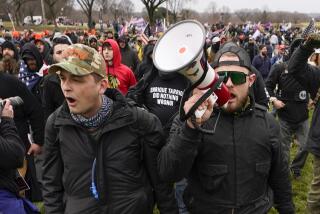Lodi Terror Trial Enters Final Round
- Share via
SACRAMENTO — After nearly eight weeks of testimony, much of it focused on the credibility of the FBI’s undercover informant, the terrorism trial of two Pakistani Americans from Lodi, Calif., will be handed to jurors by the end of the week.
The case hinges on whether Hamid Hayat attended what the government contends was a terrorism training camp in Pakistan in late 2003.
A 23-year-old junior high school dropout, Hayat is charged with “providing material support” to terrorism.
He and his father, ice cream vendor Umer Hayat, 48, are charged with lying to the FBI about the camp.
Defense lawyers plan to rest their case today with a final witness to bolster their contentions that the government has not proved Hayat went to such a camp and that, even if he had, it would have been more like a Baptist summer camp than a school for suicide bombers.
Closing arguments are expected Wednesday in Hamid Hayat’s case and Thursday for Umer Hayat’s.
Today, the defense plans to call professor Anita Weiss, an expert on Pakistan at the University of Oregon. According to an outline of her proposed testimony filed with the court, Weiss will testify about the existence of many Muslim tablighi youth camps and religious retreats in Pakistan that do not have a terrorist agenda.
Weiss will also testify that Jamiat ulema-e-Islam, a Pakistani political party that the government says is affiliated with the alleged terrorist camp, has a long history of running youth camps. Maulana Fazlur Rehman, who heads a faction of the party, is a prominent opposition member of the Pakistan parliament. Hamid Hayat’s maternal grandfather is also a party member.
Today’s expert testimony may steer some of the focus back on the defendants.
That might be a relief for the government. Much of the testimony so far has centered on the credibility of the government’s key witness, 32-year-old Pakistani immigrant Naseem Khan.
A former Oregon convenience store clerk, Khan was hired by the FBI in 2001 to infiltrate Lodi’s Muslim community.
Assistant U.S. Atty. Laura Ferris made what now looks like a misstep when she asked Khan what he had first told FBI agents when they approached him in Bend, Ore., in October 2001.
Khan said that just as agents began interviewing him an image of wanted terrorist Ayman Zawahiri -- Al Qaeda’s No. 2 to Osama bin Laden -- appeared on his television.
Khan told the agents that he had seen Zawahiri regularly attending the mosque and lecturing young people in Lodi, where Khan lived in 1998 and 1999.
The sensational claim was quickly dismissed by terrorism experts, who said Zawahiri was unlikely to have visited the United States after 1995.
After defense attorneys said they planned to bring in a parade of prominent Lodi Muslims to testify that Zawahiri had not been anywhere near the local mosque, the government issued a statement informing the jury that it had no proof the Al Qaeda leader had been in the Central Valley town that is home to about 2,500 South Asian Muslims.
But the false Zawahiri sighting posed a question that the defense has continued to exploit: If the government knew that the report was false, why did it hire Khan to work as an undercover agent?
Other issues raised by the defense about Khan included the nearly $230,000 he was paid to spy on his fellow Muslims and secretly record their conversations; Khan’s 1993 Sutter County conviction for burglary; and the circumstances under which Khan obtained U.S. citizenship in 2004.
Khan, who earned $7 an hour as a convenience store clerk, testified that he received about $3,500 a month for his FBI undercover work, which included translating his secretly recorded tapes.
The rest of the money, he said, was for expenses.
The FBI also supplied Khan, whom they code-named “Wildcat,” with a leased SUV.
Khan said the burglary conviction was the result of his having written a bad check when he was 19.
He spent two days in jail and received three years’ probation.
Khan said the FBI played no role in helping him obtain citizenship.
Since the trial began Feb. 16, Khan has testified seven times.
The latest testimony, on Wednesday, occurred after Khan told his FBI handlers that he had found a secret tape recording he made of defendant Hamid Hayat in 2002. He said it was tucked into a box of blank cassettes in his Sacramento-area home.
This prompted defense attorneys to ask Khan, who had earlier testified that he had turned over all tapes related to the investigation to the FBI, if there were any other missing recordings.
In addition, attorney Wazhma Mojaddidi, who represents Hamid Hayat, queried Khan about when he told a former girlfriend in Oregon that he had been working as an undercover operative for the FBI.
Khan said that he told his girlfriend only after receiving permission from his FBI handlers in June 2005, when the Hayats were arrested.
The defense contends that Khan told her much earlier and that this constitutes another challenge to Khan’s credibility.
As defense attorneys grilled FBI agents about their dealings with the controversial informant over the missing tape last week, one of the handful of reporters following the trial quipped: “The Naseem Khan Trial.”
More to Read
Sign up for Essential California
The most important California stories and recommendations in your inbox every morning.
You may occasionally receive promotional content from the Los Angeles Times.













